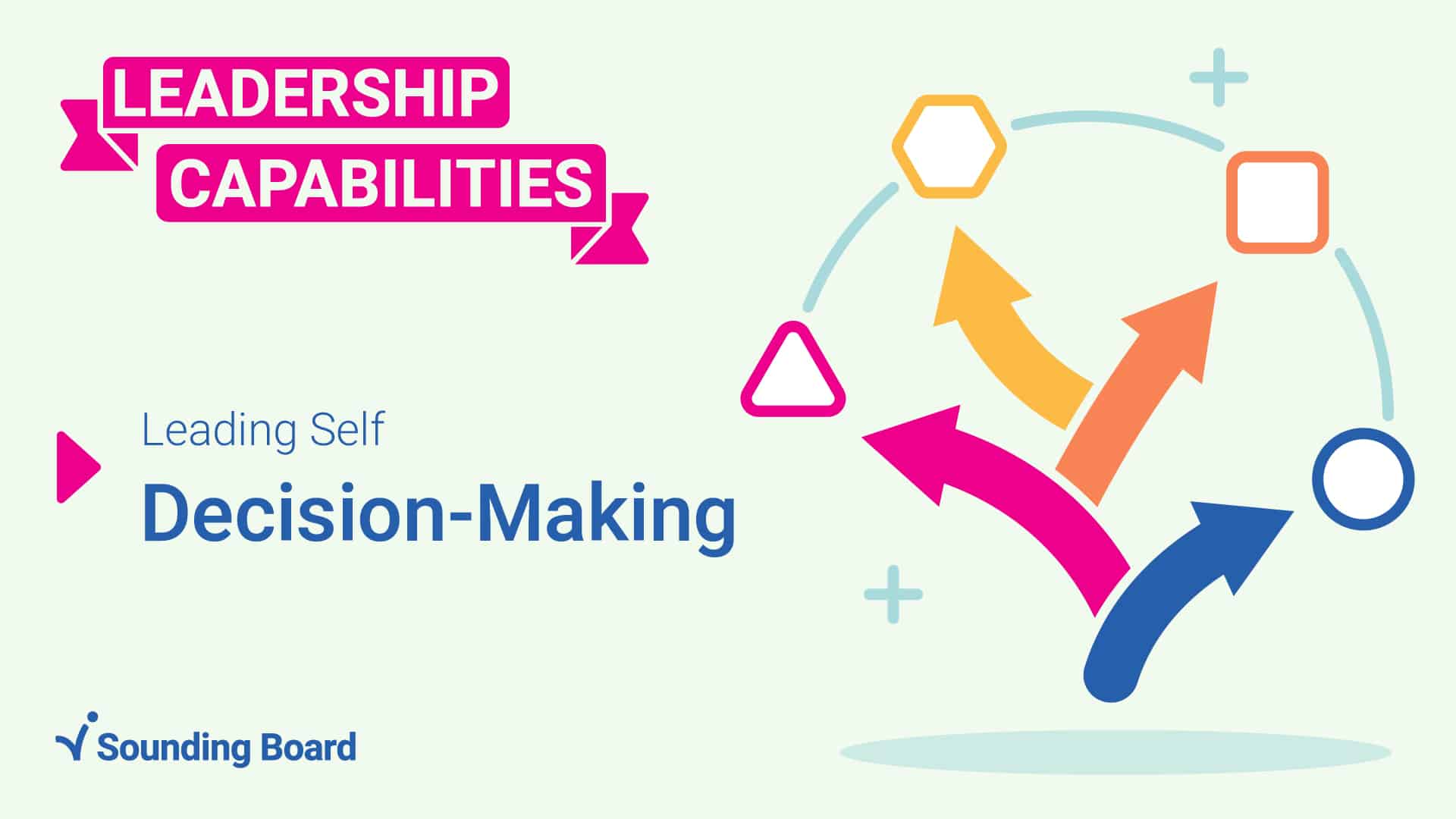This blog is part of a 16-part series focused on what capabilities make a strong leader. Sounding Board has identified 16 leadership capabilities that the strongest leaders possess. These were developed from research-backed leadership theories, leadership competencies used for evaluation from top business schools, and 25+ years of practical coaching application.
Great leaders understand how to balance emotion with reason, and have the decision-making skills to positively impact themselves, their employees, customers, stakeholders, and their organizations. Making good decisions in difficult situations is no small feat. They often involve change, uncertainty, stress, and sometimes dealing with others’ unfavorable reactions.
Having good decision-making skills also means building critical thinking skills with which to ascertain the problem, and come up with a solution that is beneficial to the company and employees. Further, leaders have to maintain fairness when making decisions. They should be unbiased and communicate appropriately for the situation.
A leader with strong decision making skills will:
- Seek data to validate accuracy and relevancy in potential solutions
- Combine experience and intuition with data to find the best solution
- Assess ideas, choices, proposals, and possible outcomes
- Make timely decisions
You can build good decision-making skills
Everyone is not born with good decision-making skills. Many have to cultivate them, and leadership coaching is a great way to do that. The right coach will challenge you, invite new thinking, promote new skills acquisition, and support lasting behavioral change. Then, with thoughtful practice, it becomes easier to consistently decide what is the right thing to do, at the right time, for the right reason.
Three critical decision-making skills great leaders find essential include:
1. Logical reasoning
Strategic decision making requires leaders to analyze all the facts presented in a situation. Leaders need to use logical reasoning to weigh the pros and cons of their potential course of action. In order to improve decision-making skills, leaders need to be self-aware, and understand their emotions to ensure they make objective and rational decisions.
3. Problem-solving
Leaders can employ problem-solving skills to make crucial decisions for their business, talent concerns, or most anything. It requires that they factor in different viewpoints, and consider different variables — timing, barriers, strategic priorities — in tandem with a detailed scope of the problem at hand. Then, they must use all of the information to make a thoughtful decision.
4. Emotional intelligence
To develop strong decision-making skills, leaders need to be aware of, have control over, and express their emotions in a healthy and measured way. Leaders should not let their emotions take over when making informed decisions. They must have high emotional intelligence to effectively process and convey their decisions and point of view to others during the decision-making process.
Leadership coaching can help to build all of these skills. When done well, using a leader’s current challenges and responsibilities as the backdrop, a skilled coach can help to align new behaviors to productive and profitable decision-making.
Why is good decision making so important?
A leader must be prepared to make a host of different types of decisions, and the following results often follow effective decision-making:
- They help you deal with problems: When challenges arise — whether individually or organizationally motivated — creating a positive outcome often depends on a leader’s final decision. Businesses run more smoothly when leaders make sound decisions at the right time, and without delay.
- They can be motivational: A leader’s primary job is to empower talent to work as productively as possible. When employees see that their manager has consistently great decision-making skills, it gives them a skill to emulate as they grow in their own development. It can also encourage discretionary effort, communication, and collaboration.
- They save time: We’re all extremely busy these days. Schedules are packed, and it’s tough to manage a team. Making effective decisions can ease delegation, reduce errors, and employees won’t need to wonder and waffle over what to do. Sound decision-making provides clear direction.
- They improve productivity: Effective decisions can propel work projects forward, which increases employee productivity. Most working professionals have been frustrated by a stalled task when they can’t get a decision from management. This slows down work and creates inefficiency. However, when a leader can weigh the pros and cons of a task and give decisions more quickly, it allows the employees to start work faster.
Put better decision-making at work into practice
There are various ways that leaders can develop their decision-making skills and put them into practice. A savvy leadership coach will enable and help develop these, so:
- Confront the most stressful decisions first: Procrastination is one of the biggest threats to good decision making. Many people avoid making decisions that cause stress or anxiety. Tackling troubling items first can prevent further stress, and allow business to run more smoothly.
- Be well-informed: The more research leaders do and the more detailed information they gather, the better equipped they are to make an informed decision. It’s important to know what factors are involved in the decision and any other information needed to fully understand the big picture and the details at hand.
- Avoid making decisions based on emotions: Making decisions based only on emotions can lead to impulsiveness and poor choices. If leaders are emotionally attached to an issue or decision that must be made, it’s often best not to make it until they can be objective about the matter. Consider the main facts surrounding the decision rather than feelings about it, and don’t be afraid to ask for additional time to ensure you are as clear-headed as possible.
Start now
Not sure where to start? The team at Sounding Board has you covered. Our network of certified coaches are highly trained in leadership development and can offer personalized solutions to help your leaders — and your business — thrive. For more information, reach out to our team. We will help you understand the value of our specialized coaches for your organization, and help you get started today.











